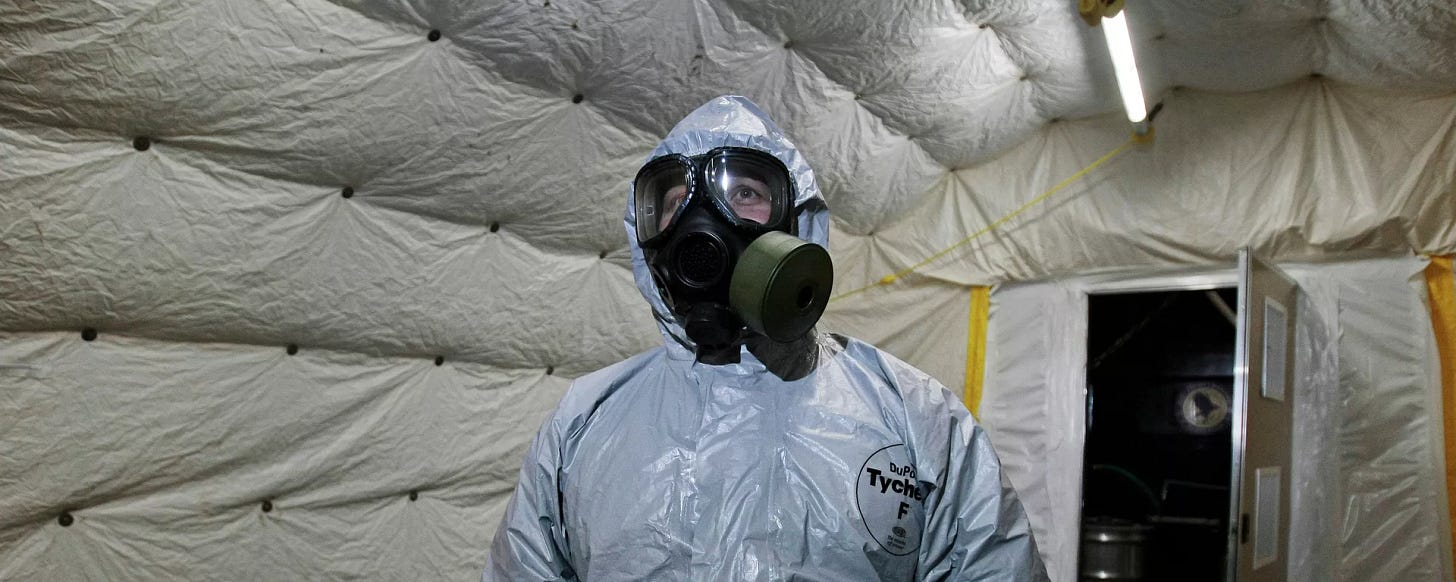Ghouta alleged chemical attack in 2013 was the first of many false flags
Article for Sputnik on the ten year anniversary of the alleged Ghouta chemical attacks in Damascus suburbs
Ten years ago, anti-government militants in Syria staged a deadly "false flag" attack that nearly led to a US invasion.
On August 21, 2013, Syrian militants fighting against the government of Bashar Assad used shells loaded with sarin to attack Eastern Ghouta, a densely populated area located on the eastern outskirts of the Syrian capital of Damascus.
The attack, which claimed somewhere between 300 and 1,700 lives, took place after then-US President Barack Obama swiftly labeled any potential use of chemical weapons by the Syrian government as a "red line" for the United States.
Western powers were quick to blame the attack on the Syrian government, with the United States even openly mulling an invasion of the Middle Eastern country.
The ensuing crisis was brought to a peaceful resolution thanks to a deal brokered with the help of Russia, which involved the destruction of Syria's chemical weapons under the supervision by the UN and the Organization for the Prohibition of Chemical Weapons (OPCW).
This last-minute reversal of Obama's red-line policy on chemical weapons in Syria was apparently caused by several factors, according to Vanessa Beeley, an independent investigative journalist who specializes in Middle Eastern affairs.
"James Clapper, Obama’s director of national intelligence, told the president that the intelligence on Syria's use of sarin gas was not a 'slam dunk' a term that was chosen to echo the 'slam dunk' weapons of mass destruction that Bush used as a fraudulent pretext to invade Iraq," Beeley told Sputnik.
She pointed out that Obama, who at the time "had committed to an increase in US military personnel in Afghanistan," was reluctant to become "coerced into similar commitments in Syria."
"Of course, Obama was also responsible for an increase in drone warfare, particularly in Yemen, but his reluctance to be forced to follow through with military aggression based on a potentially dodgy dossier was the basis for his backpedaling on the red line rhetoric which took many by surprise in his administration," Beeley remarked.
The journalist also speculated that the Obama administration at the time likely thought that the Bashar Assad’s government would not last long and did not foresee Russia coming to Syria's aid in 2015.
"Obama's prudence was based on his intelligence advice but also on the expectation that the US agenda would be achieved in Syria without muddying the waters and turning the conflict into a direct one and confrontation with Syria's allies, namely Iran and Hezbollah," speculated Beeley. "It was believed that a terrorist proxy war fuelled and armed by the US alliance would be sufficient to overthrow the Syrian government."
She pointed out that, prior to Russia's deployment in 2015, Daesh was "flourishing" in Syria "despite the US claims that they were fighting the terror group." John Kerry, the US Secretary of State in the Obama administration, was actually recorded saying at a UN closed session that the White House hoped to use Daesh* as leverage against Assad.
These plans, however, were ultimately thwarted with Russia's help and "the tide of terror unleashed by the US/UK-led regime change cartel was turned back," Beeley said.
The journalist also mused that the crisis sparked by these chemical weapons attacks in Syria essentially shows how the West "will do everything in its power to push through regional agendas."
"The issue of chemical weapons in Syria, a narrative used extensively by Western regimes, their aligned media and even the UN based on staged events produced by their sponsored embeds (like the White Helmets) with terrorist groups in Syria, are false flags designed to justify increased direct and proxy military intervention in Syria," she explained.
Beeley also observed that "the West has a very limited playbook" as similar tactics are currently being used in Ukraine where Russia is "being held responsible for events that were staged and carried out by the Nazi brigades against Russian-speaking people," with Bucha being one such example.
"As the West gets even more desperate to achieve its goals in the Middle East and in Ukraine, there is a high risk of further such intelligence-concocted events to justify increased military pressure and intervention in both theaters of war," she surmised.
Related:
Berlin Group 21 - A review of the Organisation for the Prohibition of Chemical Weapons fact-finding mission report into the alleged use of chemical weapons in Douma, Syria April 2018 - evidence of manipulation, bias and censorship.
Link here.
Ghouta Sarin Attack - Review of open source evidence
Sarin doesn’t slice throats - the 2013 Ghouta massacre revisited
***





Find myself stunned to realize so many people died from that false flag. Somehow in the West the impact of our military is insulated from our hearts.
Covid has brought back the concept of excess death. Sudden death becoming common as it has been for all the nations where the US ostensibly brings democracy.
We take our luxuries for granted, while the world starves to feed us.
Busy fighting wildfires. Hmm how wild? Things don't add up. Still it is a picnic compared to Palestine. The hard work is cleansing, tyranny is close. Money flows to those who don't need it, what motivates them? Is that what lights the fire?
Your conclusion, Vanessa, is scary, but so true. We live in dangerous times! "As the West gets even more desperate to achieve its goals in the Middle East and in Ukraine, there is a high risk of further such intelligence-concocted events to justify increased military pressure and intervention in both theaters of war”. A totally useless question - how or even, will this end in our lifetime?